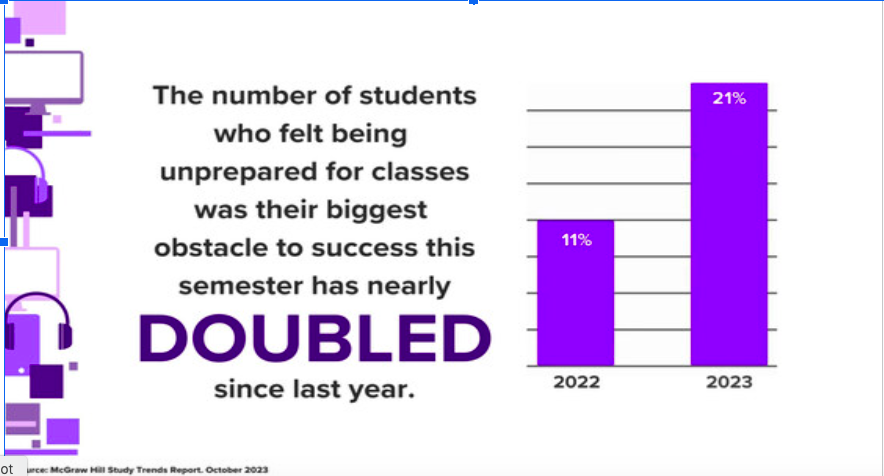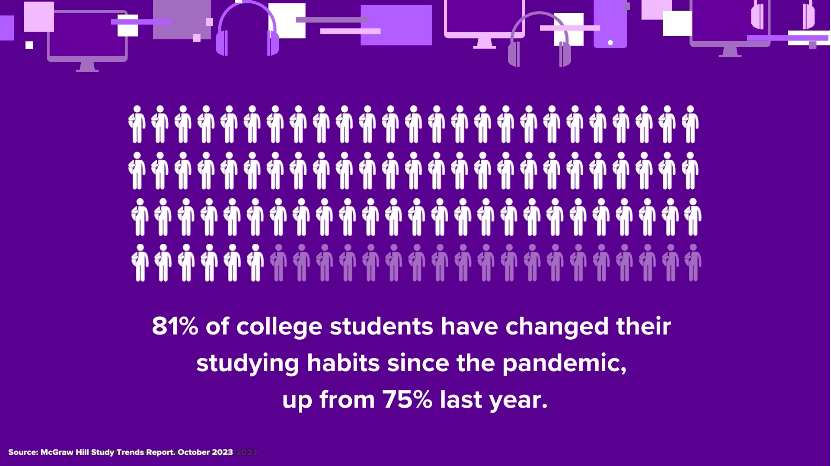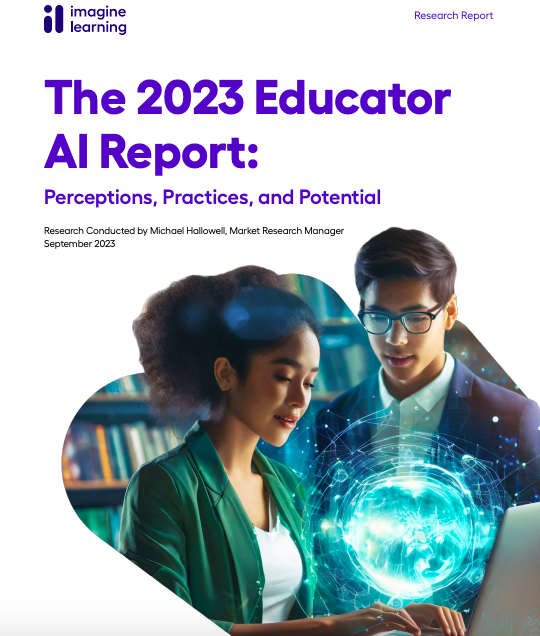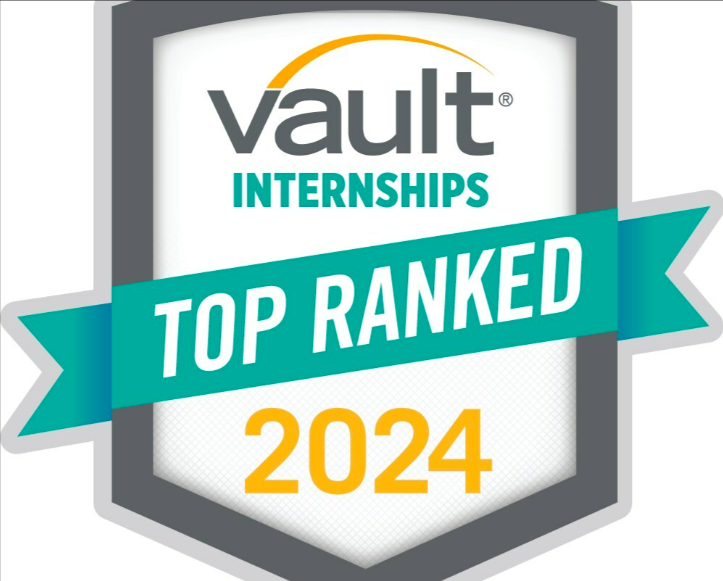McGraw Hill announced the release this month of its second annual McGraw Hill Study Trends Report examining student and instructor opinions on changing study habits, mental health concerns, student use of digital tools and more. The survey, conducted by Morning Consult on behalf of McGraw Hill, shows that while the pandemic may seem to be in the rearview mirror, the impact of learning loss on students is still gaining strength. The survey showed a sizable increase in the number of students who indicate that feeling unprepared for courses heading into the semester is the biggest obstacle to their success – up from 11% to 21% since last year. One in five students also report that learning loss caused by the pandemic has had a negative impact on their education and college preparedness.
The 2023 McGraw Hill Study Trends Report showed a sizable increase in the number of students who indicate that feeling unprepared for courses heading into the semester is the biggest obstacle to their success – up from 11% to 21% since last year.

The McGraw Hill Study Trends Report captured the views of over 500 U.S. undergraduate students and 200 college instructors on how study habits have evolved since the pandemic began. The study also found that students are increasingly turning to social media and emerging generative AI tools to supplement their course materials, with an overwhelming majority of students (80%) using ChatGPT and social media for study help.
“The survey’s findings emphasize the need for creative solutions to address learning loss and related challenges and to support educators during this time of rapid change,” said Simon Allen, CEO of McGraw Hill. “We are committed to serving learners along their individual journeys, meeting them where they are and adapting our approach to serve their evolving preferences and needs.”
Students’ Struggles are a Growing Challenge on College Campuses
Current college freshmen spent significant portions of their formative high school years dealing with COVID-related disruptions and the impact of learning loss is manifesting as students are now struggling to handle the rigorous academic demands of higher education.
Professors are observing this as well, reporting that levels of unpreparedness due to COVID-19-related learning loss are even worse than students themselves might realize. One-third of instructors reported that all or most of their students struggled due to being unprepared, while only 21% of students reported struggles for this reason. This lack of preparedness is reported as the most common obstacle to students’ success, according to the educators surveyed.

These academic struggles highlight a growing need for mental health resources within higher education institutions:
- Increased responsibilities, lack of free time and COVID-related disruptions have taken a toll on the mental health of today’s college students. A majority of students reported regularly feeling overwhelmed (57%) and stressed (56%) because of their studies.
- More than one in three (35%) of students said they had considered dropping out as a result of the difficulties they experience when studying, up from 26% in last year’s survey.
- Professors share this concern, with 90% agreeing that mental health is a growing challenge affecting undergraduate student success.
- Nearly one in four professors (24%) feel that they lack adequate resources from their institutions to effectively support students with mental health challenges.
Both Students and Professors Are Embracing Generative AI And Optimistic About Its Potential To Support Learning
Faced with rigorous courses, students are looking for tools that can support them through their study experiences and maximize their productivity during the hours they can dedicate to studying. Two thirds of students say they had to choose between schoolwork and obligations outside of school, which is a significant increase over 59% last year.
Students widely express the desire for study materials that align with the convenience and engagement of social media. Over 70% of students say they would study more, and more effectively, if their study materials were more like social media. And both students and educators are actively exploring the potential of generative AI chatbots like ChatGPT to bolster comprehension, seeking ways to navigate the challenges of modern learning. One in three students report using AI chatbots for schoolwork in the past year.
But these self-curated online materials are imperfect stopgaps, and students and instructors are aware of those flaws, especially when it comes to accuracy and trustworthiness. 46% of instructors and 39% of students express that they would be more comfortable using AI tools for coursework if the tools’ content were developed and vetted by trusted academic sources.
Justin Singh, Chief Transformation and Strategy Officer for McGraw Hill, remarked on this innovative approach, stating, “Students’ learning needs are in constant flux, and they increasingly seek technology that mirrors the engaging, convenient format of tools and technology they use in their daily lives like ChatGPT and social media. We must respond to those preferences while also meeting the high standard for accuracy and trustworthiness that content providers like McGraw Hill are known for.”
Survey Methodology
Morning Consult conducted 500 online interviews of undergraduate students and 200 college instructors between July 18th and August 11th, 2023, on behalf of McGraw Hill. The margin of error for students is +/-4% and for instructors it is +/-7%. Margin of error is greater for subgroups of either audience. Care has been taken to match the known composition of the undergraduate population on age, gender, race, region, and part-time or full-time student status.
Imagine Learning, the largest provider of digital curriculum solutions in the U.S., serving 15 million students in more than half the school districts nationwide, today released its inaugural report, “The 2023 Educator AI Report: Perceptions, Practices, and Potential,” showcasing a comprehensive exploration of AI’s current and future role in K-12 classrooms.
With Generative AI emerging as a pivotal element in the dynamic educational landscape of 2023, Imagine Learning conducted the survey to explore the perceptions, current practices, and future aspirations of educators who have already embraced technology in the classroom.

One compelling finding coming out of the report is that a resounding 90% of educators surveyed believe that AI has the potential to make education more accessible. Increasingly, teachers are recognizing that when implemented ethically and with thoughtful consideration, AI can help students with special needs, learning disabilities, and language barriers, for example, and experience more effective, personalized learning methods.
When it comes to readiness, however, only 15% of educators feel “prepared” or “very prepared” to oversee the use of Generative AI in the classroom, with over twice that number (32%) expressing they are completely unprepared to do so. What’s more, educators indicate a disparity when it comes to the likelihood of using Generative AI in the classroom, with district and school leaders perceived as less likely to embrace new AI tools when compared to educators and students.
On top of this, only one-third (33%) of surveyed educators feel that they have the support they need from their district and school leadership to successfully implement Generative AI into their teaching.
Other key findings from Imagine Learning’s report include:
- Almost half of educators (44%) who have used Generative AI believe that its use has alleviated the burden of their workload and made their jobs easier.
- Of the respondents who reported they have not used AI in the classroom, 65% cite a lack of familiarity as the primary obstacle to the future utilization of Generative AI, with 48% also expressing ethical concerns.
- 72% of educators are most concerned about plagiarism and cheating due to Generative AI, highlighting the need for clear guidelines for students for using AI with academic integrity.
“Generative AI is a blend of promise and prudence. Its transformative potential is undeniable, but the journey forward requires thoughtful consideration,” said Sari Factor, Vice Chair and Chief Strategy Officer, of Imagine Learning. “Learning is above all a human endeavor. With Generative AI as a tool to simplify lesson planning, reduce administrative tasks, and enhance personalized learning, we can empower the potential of teachers and students and improve learning outcomes.”
To learn more about the findings, you can download the full report here.
Vault, the leader in verified employer rankings and reviews, today released its 2024 Internship Rankings, highlighting the top programs in more than 30 categories. Vault’s rankings include the Most Prestigious Internships, Best Overall Internships, Best Internships by Key Employment Factor, Best Internships for Diversity, Best Internships by Role, and Best Internships by Industry. The rankings were derived from Vault’s Summer 2023 Intern Survey, which also found that interns are less confident than they were in years past about whether they would receive a full-time job offer.
Over 13K interns were surveyed from 145 programs, resulting in the most authentic & data-driven rankings in the industry

2024 Vault Top Ranked Internship Seal
“We’re excited to release our annual rankings of the leading internship programs. More than 13,000 interns were surveyed from 145 programs, providing the basis for the most authentic and data-driven rankings in the industry,” said Eric Stutzke, SVP & General Manager of Vault. Stutzke continued, “Getting an internship – and turning that internship into a full-time job offer – is highly competitive, and Vault’s rankings, employer profiles, and career guides are essential tools for college and university students that want to position themselves for career success.”
Key findings from Vault’s survey, which was fielded in Summer 2023, include:
NASA continues to be the most prestigious internship: Interns rated the prestige of dozens of programs, and the federal agency continues to hold on to the #1 spot. Other top programs on Vault’s Most Prestigious Internships list include tech giants, Wall Street icons, and the CIA.
Accounting firms move up the list of Best Overall Internships: Interns also rated their own programs on Quality of Life, Compensation & Benefits, Interview Process, Career Development, Full Time Employment Prospects, and Diversity. These ratings were the basis of Vault’s Best Overall Internships list. New York-based accounting firm PKF O’Connor Davies took the #1 spot, and several other accounting firms landed in the top 10 for the first time. Unlike some other majors, fewer students are graduating with accounting degrees than in the past. Growing accounting firms looking to expand their regional and national presence make considerable efforts to attract and retain these students.
In an unpredictable economy, uncertainty about full-time job offers is rising: Among those interns who were eligible for full-time employment offers, 49% said they received or expected to receive an offer, 45% were uncertain, and 6% had already been denied an offer. During the same survey window last year, 60% of offer-eligible interns said they received or expected to receive an offer, 35% were uncertain, and 5% had already been denied an offer.
Interns should be prepared to go into the office: 91% of interns reported that their internships were either fully in-person or hybrid. Only 9% of internships were fully remote.
The Top 10 Most Prestigious Internships for 2024:
- NASA
- Microsoft
- Apple Inc.
- Goldman Sachs & Co.
- Morgan Stanley
- SpaceX
- McKinsey & Co.
- Central Intelligence Agency (CIA)
- J.P. Morgan
The Top 10 Best Overall Internships for 2024:
- PKF O’Connor Davies Internship
- Ellucian Inc. Internship Program
- HITT Futures Internship
- Weaver Internship
- Frazier Deeter Internship Program
- Harris Williams Summer Associate and Analyst Program
- Graybar Internship Program
- Lumsden & McCormick Internship Program
- Elliott Davis ENVISION Summer Internship
- Freed Maxick MAX Internship Program
Best Internships by Industry:
Accounting: PKF O’Connor Davies Internship
Construction & Trades: HITT Futures Internship
Consulting: Bates White Summer Consultant Program
Energy & Renewables: American Electric Power Internship
Financial Services: Huntington Bank Internship Program
Health Sciences: Gilead Internship Program
Investment Banking: Harris Williams Summer Associate and Analyst Program
Media: Paramount Internship Program
Retail & Consumer Products: The Home Depot Internship Program
Tech & Engineering: Ellucian Inc. Internship Program
Travel & Transportation: FedEx College Connections Intern Program
Wholesalers & Distributors: Graybar Internship Program
View all the Vault Internship Rankings.

